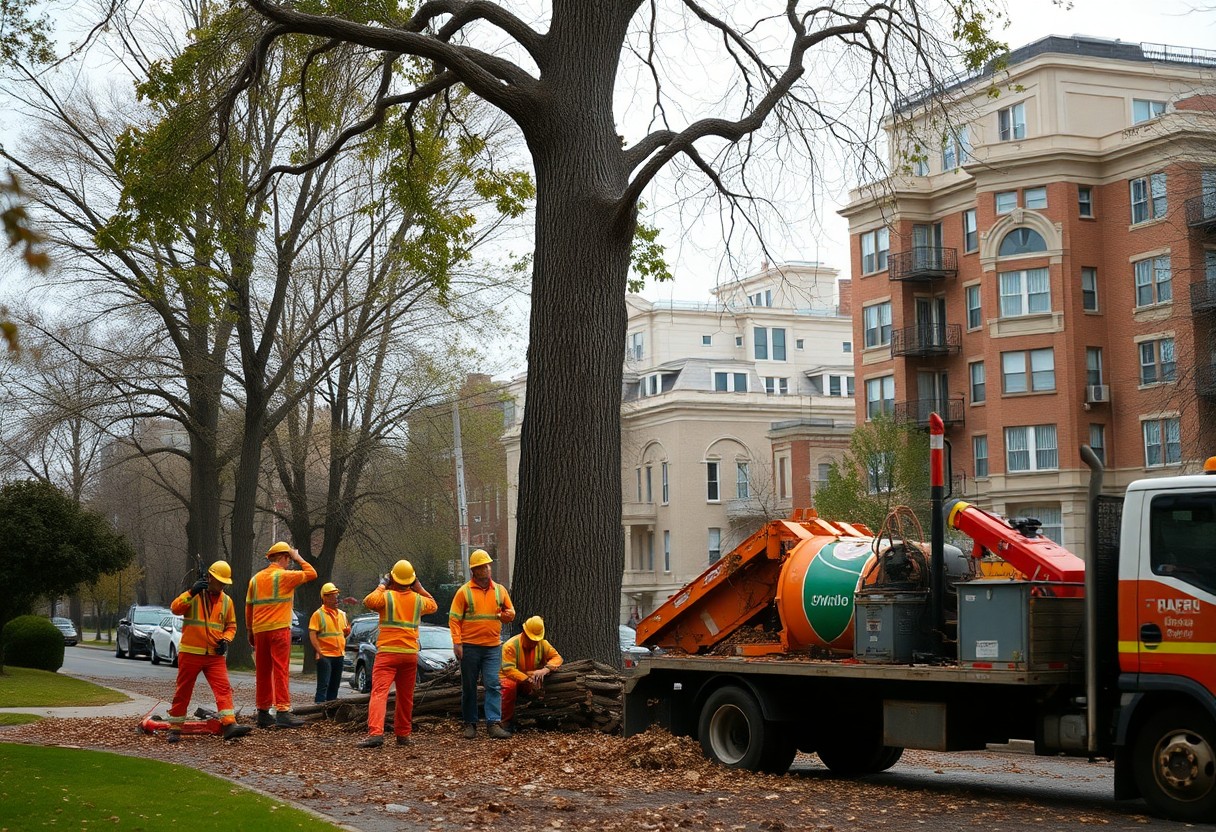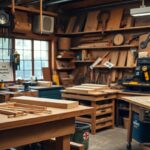It’s easy to overlook insurance when setting up your woodworking workshop, but proper coverage protects your investment and livelihood.
Your workshop faces unique risks, from equipment damage and theft to potential injuries and liability claims. As a woodworker, you need specific insurance policies tailored to your operation’s size, the equipment you use, and whether you have employees or teach classes.
Understanding these requirements helps you secure the right coverage and ensures your business can withstand unexpected setbacks.
Basic Insurance Coverage
A comprehensive insurance plan for your woodworking workshop should cover multiple aspects of your business operations.
You’ll need protection against various risks that could impact your workshop, equipment, and liability towards others.
Understanding these fundamental coverage types helps you make informed decisions about safeguarding your woodworking business.
General Liability Insurance
Basic general liability insurance protects you against third-party claims for bodily injury and property damage. You’ll need this coverage if clients visit your workshop, you work at client locations, or your products cause injury or damage.
This insurance typically covers legal fees, medical expenses, and settlement costs up to your policy limits.
Property Insurance
About your workshop’s physical assets, property insurance covers your building, machinery, tools, materials, and finished products against fire, theft, vandalism, and natural disasters.
You’ll want to ensure your coverage limits accurately reflect the full value of your equipment and inventory.
Hence, when selecting property insurance for your woodworking business, you should consider additional coverage options like business interruption insurance to protect your income during repairs, and equipment breakdown coverage for mechanical failures. Your policy should also account for any specialized or custom machinery you use in your workshop.
Specialized Workshop Protection
Even the most well-maintained woodworking workshops face unique risks that require specific insurance coverage. Your workshop’s distinctive operational needs demand tailored protection that goes beyond standard business insurance policies.
From specialized machinery to raw material storage, comprehensive coverage ensures your woodworking business remains protected against unforeseen events.
Equipment Coverage
With expensive machinery forming the backbone of your woodworking operation, you need dedicated equipment insurance that covers both breakdown and accidental damage.
Your policy should include protection for CNC machines, table saws, planers, and other specialized tools. This coverage helps you maintain business continuity by covering repair or replacement costs when equipment fails.
Raw Materials Insurance
Across your workshop, valuable wood supplies and materials represent a significant investment. Your insurance should cover both stored and in-process materials against damage from fire, water, theft, and environmental factors.
This protection ensures your inventory remains secure and your business stays resilient.
Understanding the fluctuating values of your raw materials is imperative when selecting coverage limits. You should consider seasonal price variations, storage conditions, and the specific types of wood you work with.
Your policy needs to reflect peak inventory periods and account for both domestic and exotic wood species in your storage.
Worker Safety Insurance
Keep your woodworking workshop protected with comprehensive worker safety insurance coverage.
This vital protection safeguards your business and employees from financial losses due to workplace accidents or injuries.
Your policy should align with state regulations and industry standards while addressing the specific risks associated with woodworking operations.
Workers’ Compensation
Workers’ compensation insurance protects your business and employees if they get injured on the job. You need this coverage if you have employees, as it’s required by law in most states.
This insurance covers medical expenses, lost wages, and rehabilitation costs, while also protecting your business from potential lawsuits related to workplace injuries.
Disability Coverage
About 25% of today’s 20-year-olds will experience a disability before retirement age. Your woodworking business needs disability coverage to protect both you and your employees from income loss due to temporary or permanent disabilities resulting from workplace accidents or illnesses.
It’s worth noting that disability coverage comes in both short-term and long-term options. You can customize your policy based on your workshop’s size, number of employees, and specific risks associated with your woodworking operations.
This insurance helps maintain financial stability for your workers during recovery periods and supports their return to work.

Business Interruption Coverage
Despite having property insurance for your workshop, unexpected events can halt your woodworking operations for weeks or months.
Business interruption coverage helps you maintain financial stability during these downtimes by covering ongoing expenses and lost revenue while your workshop recovers from covered losses like fire, storm damage, or equipment breakdown.
Income Protection
Any disruption to your woodworking business can severely impact your cash flow. Income protection coverage compensates you for lost profits during the recovery period, helping you meet payroll obligations, loan payments, and other fixed costs.
This coverage ensures your business remains financially stable while you work to restore normal operations.
Temporary Relocation Costs
Around 60% of businesses face significant challenges when forced to relocate after a disaster. Your business interruption policy can cover expenses for moving your woodworking operations to a temporary location, including rental costs, equipment transportation, and utility setup fees.
Temporary relocation benefits in your policy can include coverage for increased operating costs at the interim location, additional advertising to inform customers of your new address, and expenses related to maintaining both your original and temporary workshop spaces during the transition period.
You should review these specific coverages with your insurance provider to ensure adequate protection for your woodworking business.
Fire and Hazard Protection
Once again, your woodworking workshop faces significant risks from fire and hazardous materials. To protect your investment and ensure business continuity, you need comprehensive coverage that specifically addresses these dangers.
Your insurance policy should include both fire protection and hazardous materials coverage as fundamental components.
Fire Insurance Requirements
An effective fire insurance policy for your woodworking workshop must cover the building structure, equipment, raw materials, and finished products.
You’ll need to maintain proper documentation of your fire prevention systems, including sprinklers, alarms, and extinguishers. Your policy should also account for business interruption costs during potential recovery periods.
Hazardous Materials Coverage
The proper handling and storage of finishes, solvents, and other chemicals in your workshop requires specific insurance coverage.
You must ensure your policy addresses potential spills, proper disposal procedures, and any environmental impact from these materials. Your coverage should extend to both on-site incidents and transportation of hazardous materials.
Hazard insurance for your workshop should also include coverage for employee exposure to harmful substances, proper ventilation requirements, and storage facility specifications.
You’ll need to maintain detailed inventory records of all hazardous materials and regularly update your insurance provider about changes in storage quantities or types of materials used.
Client Protection Policies
After establishing your woodworking workshop, you need to implement comprehensive client protection policies to safeguard both your business and customers.
Your policy framework should include clear terms of service, warranty information, and dispute resolution procedures. This protection layer helps build trust with clients while minimizing potential legal complications.
Product Liability
One of your primary insurance needs is product liability coverage, which protects your business if a client claims injury or damage from your woodwork products.
This insurance covers legal costs and compensation claims related to design flaws, manufacturing defects, or inadequate warning labels on your finished pieces.
Professional Indemnity
Against claims of professional negligence or errors in your woodworking services, professional indemnity insurance provides vital coverage.
This policy protects you when clients allege financial losses due to your advice, designs, or project management decisions.
Considering the custom nature of woodworking projects, your professional indemnity coverage should match your business scope.
You’ll want to ensure adequate limits for large-scale projects and include coverage for design services, consultations, and project modifications.
This protection becomes particularly valuable when working with high-end custom furniture or architectural installations.
To wrap up
Presently, securing comprehensive insurance coverage for your woodworking workshop is an necessary step in protecting your investment and business future.
You’ll need to maintain adequate coverage for general liability, property damage, workers’ compensation, and specialized equipment protection.
By working with an experienced insurance provider who understands the woodworking industry, you can ensure your workshop meets all legal requirements while safeguarding against potential risks.
Taking time to regularly review and update your coverage will help you maintain a sustainable and protected woodworking operation.







